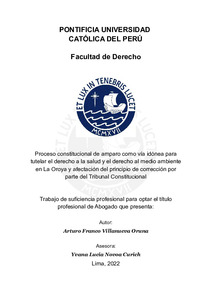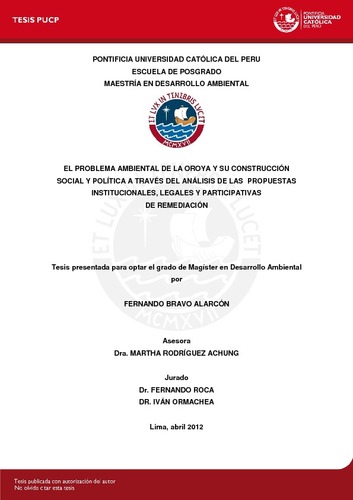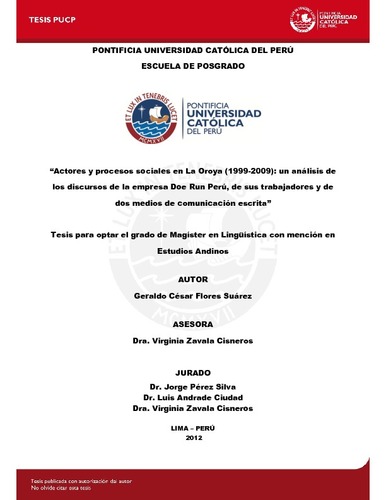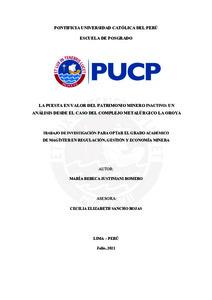| dc.contributor.advisor | Novoa Curich, Yvana Lucía | |
| dc.contributor.author | Villanueva Oruna, Arturo Franco | |
| dc.date.accessioned | 2022-08-05T17:16:21Z | |
| dc.date.available | 2022-08-05T17:16:21Z | |
| dc.date.created | 2022 | |
| dc.date.issued | 2022-08-05 | |
| dc.identifier.uri | http://hdl.handle.net/20.500.12404/22947 | |
| dc.description.abstract | El presente informe se centra primeramente en identificar al proceso de amparo como la
vía procesal más idónea para tutelar el derecho a la salud y el derecho al medio
ambiente en La Oroya y, por otro lado, también se busca señalar una afectación al
principio de corrección del buen gobierno por parte del Tribunal Constitucional al
declarar fundada en parte la primera pretensión de la demanda. La justificación de este
informe es la de proponer una vía procesal más idónea a la utilizada por los
demandantes y asimismo a la luz del principio de corrección proyectar una justificación
inadecuada por parte del Tribunal Constitucional en su decisión final. Mis hipótesis
respecto a los problemas jurídicos hallados en la sentencia son las siguientes: (i)
estratégicamente en materia procesal se debió iniciar en primer lugar un proceso de
amparo; y (ii) el Tribunal Constitucional debió declarar fundada en su totalidad la
primera pretensión de la demanda ya que con ello se respeta el principio de corrección
del buen gobierno. Sobre el marco teórico, he utilizado contenidos del derecho
constitucional y del buen gobierno para el análisis de la mencionada sentencia. La
conclusión principal para ambas hipótesis es la siguiente: La afectación al derecho a la
salud y al derecho al medio ambiente en la Oroya es provocada por la actividad de la
empresa Doe Run Perú y por la inacción del Estado, con lo cual el proceso de amparo
en este caso en particular permite que a nivel procesal el petitorio y la parte demandada
sean dirigidos directamente hacia los responsables de los derechos afectados, y por
consiguiente se lograría una tutela más idónea. Por otro lado, optar por declarar fundada
en su totalidad la primera pretensión de la demanda reflejaría una actuación acorde al
principio de corrección por parte del Tribunal Constitucional, en tanto como resultado
en la decisión final se consideró como incumplido por parte del Ministerio de Salud y
DIGESA, el mandato legal objeto de evaluación. | es_ES |
| dc.description.abstract | This report focuses first on identifying the amparo process as the most suitable
procedural route to protect the right to health and the right to the environment in La
Oroya and, on the other hand, it also seeks to point out an affectation to the principle of
correction good governance by the Constitutional Court by declaring partially founded
the first claim of the claim. The justification of this report is to propose a more suitable
procedural route to the one used by the plaintiffs and also, in light of the principle of
correctness, to project an inadequate justification by the Constitutional Court in its final
decision. My hypotheses regarding the legal problems found in the judgment are the
following: (i) strategically in procedural matters, an amparo process should have been
initiated first; and (ii) the Constitutional Court should have declared the first claim of
the lawsuit founded in its entirety, since this respects the principle of correctness of
good governance. Regarding the theoretical framework, I have used contents of
constitutional law and good governance for the analysis of the aforementioned sentence.
The main conclusion for both hypotheses is the following: The impact on the right to
health and the right to the environment in La Oroya is caused by the activity of the
company Doe Run Peru and by the inaction of the State, with which the process of
Amparo in this particular case allows the request and the defendant to be directed
directly at the procedural level to those responsible for the affected rights, and therefore
a more suitable protection would be achieved. On the other hand, choosing to declare
the first claim of the lawsuit founded in its entirety would reflect an action in
accordance with the principle of correction by the Constitutional Court, as a result of the
final decision it was considered as non-compliant by the Ministry of Health and
DIGESA, the legal mandate under evaluation. | es_ES |
| dc.language.iso | spa | es_ES |
| dc.publisher | Pontificia Universidad Católica del Perú | es_ES |
| dc.rights | info:eu-repo/semantics/openAccess | es_ES |
| dc.rights.uri | http://creativecommons.org/licenses/by/2.5/pe/ | * |
| dc.subject | Acción de amparo--Legislación--Perú--La Oroya (Junín : Distrito) | es_ES |
| dc.subject | Recurso de amparo--Legislación--Perú--La Oroya (Junín : Distrito) | es_ES |
| dc.subject | Salud--Legislación--Perú--La Oroya (Junín : Distrito) | es_ES |
| dc.subject | Medio ambiente--Legislación--Perú--La Oroya (Junín : Distrito) | es_ES |
| dc.title | Proceso constitucional de amparo como vía idónea para tutelar el derecho a la salud y el derecho al medio ambiente en La Oroya y afectación del principio de corrección por parte del Tribunal Constitucional | es_ES |
| dc.type | info:eu-repo/semantics/bachelorThesis | es_ES |
| thesis.degree.name | Abogado | es_ES |
| thesis.degree.level | Título Profesional | es_ES |
| thesis.degree.grantor | Pontificia Universidad Católica del Perú. Facultad de Derecho. | es_ES |
| thesis.degree.discipline | Derecho | es_ES |
| renati.advisor.dni | 45449191 | |
| renati.advisor.orcid | https://orcid.org/0000-0002-3406-100X | es_ES |
| renati.author.dni | 70688281 | |
| renati.discipline | 215106 | es_ES |
| renati.juror | Higa Silva, César | es_ES |
| renati.juror | Cornejo Amoretti, Leandro | es_ES |
| renati.level | https://purl.org/pe-repo/renati/level#tituloProfesional | es_ES |
| renati.type | https://purl.org/pe-repo/renati/type#trabajoDeSuficienciaProfesional | es_ES |
| dc.publisher.country | PE | es_ES |
| dc.subject.ocde | https://purl.org/pe-repo/ocde/ford#5.05.01 | es_ES |









